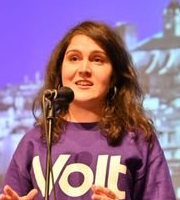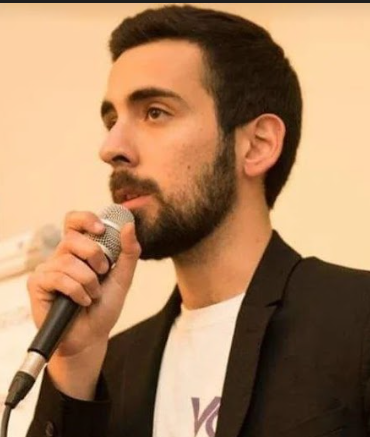
Hosting salons as a way to engage, build agency, connect networks and co-create coherent fields
"Future made in Europe" – this slogan of the VOLT party is also a suitable header for our European Integral Political Salon which was kicked-off in January 2023. After a first round of a dozen Integral Political Salons held within the German-speaking community, this new European format emerged out of the LiFT Politics Learning Lab in August 2022. In this context, numerous participants had voiced their desire for an ongoing meeting space for continuing the conversation about a new politics, based on a holistic/integral/metamodern paradigm.
So Elke Fein (IFIS), Roberto Bonino (Italy) and Veronica Gullbrandson (Sweden) set up a salon design and hosted the first such co-creative circle, attended by 16 participants. The aim was to invite a transnational conversation about new, more holistic ways of doing politics, and about how we can transform our existing political systems towards a new paradigm/integral operating system.
Conceived as a joyful, interactive and explorative gathering, the salon intends to provide both inspirational input from experts and practitioners in the field, as well as space for dialog, sharing and exchange about the implications of a holistic/integral paradigm in the realm of politics.
As to the thematic part of the salon, we decided to start by inviting experiences from existing innovative political parties across Europe which are trying to transform politics from within the current political system.
This first European salon was dedicated to experiences of the pan-European VOLT party, which was presented by three young activists from VOLT Italy and Germany. Founded in 2017, VOLT Europa is registered as a national party in several European countries, but sees itself essentially as a pro-European party in a citizens' movement. The name “VOLT” has been chosen, first, because it symbolizes bringing "new energy" for Europe as well as speed and efficiency into the teamwork and second, because this term can be understood in all member countries.
VOLT’s approach implies a number of both legal and substantial innovations. While so far, political representation is organized based on nation-states, socio-political realities have long moved on. Citizens have become used not only to traveling between and even spending part of their (work) lives in different EU member states, many of them have also been socialized in several cultures, languages and family settings at the same time. Especially for the young generation, it has become natural to take a transnational or global perspective, given the challenges we are collectively facing. VOLT is trying to respond to these developments by offering citizens to engage wherever they are in the EU – and to work towards joint European solutions.
Silvia Panini, one of our guests from VOLT Italy, says: “the greatest innovation Volt can bring to European politics is to create a community between people who seem very different from each other. This applies to people who now live in different countries of the European Union but feel part of the same ‘people’, but also to people with different social backgrounds and from different generations. The idea of recreating community is what the mass parties of the 19th century were also based on. Now that society is characterized by galloping individualism, it is important to try to return to this concept” – or to adapt the concept to changing conditions.

“In the end, politics is the management of the 'common thing' and therefore, it is all of us” (Silvia Panini).
One of the recurring topics in this salon was the tension between political goals and visions and the practical challenges of implementing these in real life situations. Silvia and her colleague Gianluca Guerra from VOLT Italy shared some of their experiences in an interview with Roberto Bonino (EIPS co-host). These were completed by experiences by Johanna Reichel who has been an active member of VOLT Germany for a while.
“Trying to work outside the system, trying, for example, not to rely on confrontation and violence of language in politics, while being inside it and while trying to respect the very mechanisms we then want to change, clearly leads to difficulties and small steps. But it is precisely the internal work that leads to concrete change: in society, in people and in politics in the final instance” (Silvia Panini).
Among the positive inspirations were VOLT’s numerous internal processes, engaging people across age groups, cultures and social divides with participatory and co-creative methods, building a sense of joint agency and impact. In turn, typical challenges reported by our guests were incidents where “old” thinking and politics as usual habits kicked in, often from party members belonging to older generations who had a harder time adopting VOLT’s political culture of distributed leadership.

“Wouldn't ‘new politics’ mean to get away from super specific positions, in favor of flex-flow processes to build consensus/consent around pressing issues?” (participant of the salon)
As an overall feedback, all participants enjoyed what one of them called the "precious atmosphere” of the salon, “similar to a fire place setting”, which created a safe space for exploring even difficult parts of politics with curiosity, but without judgement. In fact, this quality is often missing in politics as usual, partly for a lack of time, but also due to the inbuilt mechanisms of our current competitive party systems. As it stands, they encourage self-staging and enemy-bashing more than a healthy dose of self-reflection and self-critique, let alone learning from competitors and sharing first person experiences for others to learn from.
“How could we be more efficient in sharing community building experiences and expertise?” (participant reflection after the salon)
This is precisely what we hope to enable in the European Integral Political Salon. We think that the challenges we are facing are too big, too serious and too urgent for cockfights between parties and individual players. In order to address them, we need the knowledge, insights and experiences of everyone. In other words: we need to tap into a deeper transnational, transrational collective intelligence and wisdom, in service of the larger common good.
“My learning is that there are great movements towards a better, transformative future, and this encourages me to do my part. I am leaving inspired and informed” (participant reflection during the salon).
The good news is that the new politics which not only sees this urgency, but is also able to listen into the collective fields and to facilitate co-creative processes for harvesting this field intelligence, is already emerging. We see pioneers of this new politics everywhere. The LiFT Politics project hosted by IFIS from 2019 to 2022 has compiled a collection of resources to help you navigate the landscape of this new politics, to learn from its pioneers – and to become part of it yourself.
“The Integral Politics experience was important and interesting precisely for this reason: doing politics also means bringing a vision of the future and not limiting oneself to contingencies. Moments of confrontation and sharing such as those offered by the Integral Politics Salon serve precisely this purpose” (Silvia Panini).
Do join us at the next European Integral Political Salon on
March 28, 2023, 19.30-22h
More info and registration: https://www.ifis-freiburg.de/en/event/european-integral-political-salon…
